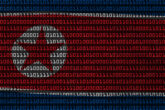April 01, 2021
North Korea’s “tactical-guided” ballistic missile test is no joke for Biden and South Korea
North Korea’s March 25 test of two short-range ballistic missiles should be taken seriously. These missiles threaten South Korea and Americans living there. The test unambiguously violates UN Security Council resolutions, and any miscalculation involving these missiles could escalate into nuclear war. War is not imminent or highly probable, but the risks are high. As such, the United States and the international community should respond firmly.
The tests indicate Pyongyang is serious about developing tactical nuclear weapons, which can be achieved by mounting nuclear warheads onto short-range ballistic missiles. After all, Kim Jong Un declared in January that he is pursuing “ultra-modern tactical nuclear weapons including new-type tactical rockets.” At the time, the broader international discourse overlooked this notable threat to South Korea and the United States. Pyongyang now appears to be putting Kim’s declared plans into action—and doing so in earnest.
The global consequences and stakes are too high to allow the regime’s nuclear weapons program to advance even further.
President Biden reacted by warning that “there will be responses if they choose to escalate. We will respond accordingly.” He also stressed that his administration is prepared for “some form of diplomacy, but it has to be conditioned upon the end result of denuclearization.” Pyongyang then criticized Biden for making statements that were “detrimental to the dignity and sovereignty” of North Korea and warned of consequences if Washington continued to make “unreasonable remarks” aimed at “slandering” North Korea “as the gravest threat to [America’s] security.”
While these short-range missiles may not be immediate threats, they could be tipped with nuclear, biological, or chemical warheads. In such a case, these missiles could hold South Korea hostage or target South Korea and Americans living there. They could even start or be used early in a conflict with South Korea and the United States. All of these scenarios affect the United States and the world.
Read the full article from the Bulletin of the Atomic Scientists.
More from CNAS
-
What Will North Korean Cybercrime Look Like in 2022?
North Korean hackers will likely continue to employ more phishing campaigns in the future while tailoring their level of obfuscation based on the target’s sophistication....
By Jason Bartlett
-
Duyeon Kim testifies before European Parliament's Committee on Foreign Affairs
Chairman McAllister, Vice Chairs, DKOR Chairman Mandl, and distinguished Members of the Committee on Foreign Affairs and the European Parliament, thank you for the opportunity...
By Dr. Duyeon Kim
-
China’s New Land Borders Law Is a Nightmare for North Korean Refugees
A combination of high-level pressure from foreign governments and steady support for grassroots refugee resettlement organizations and programs is the most practical way to as...
By Jason Bartlett
-
The Two Koreas’ Recent Arms Displays Are Sending Very Different Messages
North Korea has announced that it successfully tested a new, smaller submarine-launched ballistic missile, or SLBM, on Tuesday. State media claimed the missile—launched from t...
By Dr. Duyeon Kim


